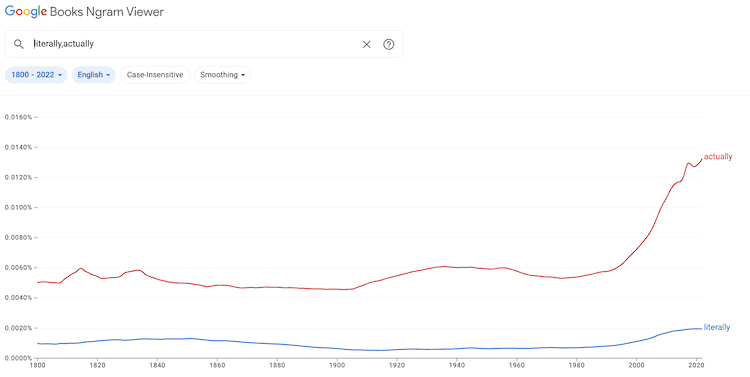
Poor or repetitive vocabulary selections can get on a reader’s nerves, with actually and really being probably the 2 worst offenders.
Whereas each adverbs have a restricted use for added emphasis or clarifying details, they’ve progressively develop into overused and pointless exaggerations.
You come throughout these two phrases continuously on social media, in addition to in on a regular basis dialog.
Nevertheless, whether or not you’re writing fiction, nonfiction, essays, and even social media posts, lowering your use will (truly) make your writing stronger.
What’s improper with these two phrases?
They’re practical adverbs, so that they have their place.
The issues come up, nevertheless, from overuse or misuse, which might make writing appear overly dramatic and even trigger redundancy.
As an alternative of utilizing them so as to add occasional readability, they typically intervene with one thing a reader would already perceive.
For instance, “He was actually fired on the spot with no rationalization” could be meant figuratively, but it surely provides nothing in anyway to the that means.
Equally, “She truly loved my new e-book” may indicate shock, but it surely typically simply provides a weak try at emphasis.
These phrases are continuously utilized in dialog when an off-the-cuff tone and exaggeration are commonplace.
However in writing, particularly persuasive writing, when precision issues, they will dilute the message.
Truly typically sneaks into dialogue or reactions in fiction, however not often modifications the that means of a sentence or an utterance.
Actually is a bit of bit trickier as a result of it means “in a literal sense or “precisely.”
Nevertheless, it’s now typically misused to exchange actually or very. “I’m actually so drained every single day.”
Easy methods to keep away from utilizing these two adverbs
The simplest method to minimize down on actually and really is to catch your self while you use them. Do you want them?
While you get to enhancing, use “discover” for each phrases. Do they alter the that means of your sentences, or are they solely pointless added extras?
If you happen to can take away both adverb with out altering some extent or altering the that means, it’s most likely value deleting.
It’s also possible to strive enhancing a sentence with stronger verbs or including extra descriptive particulars.
As an alternative of writing, “He was actually shaking when he instructed me the information,” describe how his palms have been trembling or how he caught his breath.
For a sentence like “She truly completed the race,” strive “She crossed the end line, out of breath however with a beaming smile.”
Good writing doesn’t want pointless decorations. It must be direct and clear.
In fiction writing, depend on the energy of your scene or characters, not filler phrases.
Dialogue is the one place the place these adverbs may happen extra typically, however solely use them if they’re essential to replicate a personality’s voice or angle.
However even then, use them sparingly, and solely when they are often efficient.
Like many adverbs, they’re typically lazy phrases as a result of they’re fast and simple to make use of.
Understand that truly means a stunning end result or one thing sudden, not a common emphasis.
Then again, actually means in a literal method or precisely.
That’s why “We actually died laughing” has a logic drawback.
When to make use of actually and really
Though utilizing these two adverbs is usually frowned upon, they do have a rightful place in the event you use them appropriately.
You should use actually when one thing is true in a literal and bodily sense.
For instance, “She actually bumped into her ex-husband on the grocery store” is okay if she bodily collided with him accidentally.
Nevertheless, if it was merely an opportunity encounter, maybe at a brief distance, actually doesn’t apply.
A greater sentence can be: “She ran into her ex-husband on the grocery store.”
One other right use can be “The room was so chilly, I may actually see my breath.”
If you happen to’re describing an precise visible of breath mist, then it’s acceptable.
Truly works if you end up clarifying or correcting info.
For instance:
“She thought he lived in Paris, however he truly lives in Berlin now.”
“Individuals say the e-book is fiction, but it surely’s truly based mostly on details and actual occasions.”
You could possibly additionally use these phrases deliberately in dialogue if you wish to add to a personality’s character or tone.
For instance, “I actually can’t watch that film ever once more” might go well with a dramatic or sarcastic speaker in an off-the-cuff context.
Equally, “Truly, I feel you’re completely improper,” can replicate directness or defiance.
Simply do not forget that in narration, dialogue, or any type of writing, any overuse will weaken your impression.
If too many sentences depend on these phrases for emphasis, they may cease including something in any respect and have probability of annoying readers.
Adverbs are too fast and simple
As a result of adverbs are so versatile, it’s tempting to overuse them. You’ll be able to modify a verb, an adjective, and even one other adverb.
He stated loudly. (Modifying a verb)
The film was surprisingly good. (Modifying an adjective)
She moved extremely rapidly by way of the gang. (Modifying an adverb)
Nevertheless, in most types of writing, it’s higher to make use of stronger vocabulary in the event you can to scale back your use of adverbs.
Listed here are fast fixes for the sentences above.
He shouted.
The film was wonderful, to my shock.
She raced by way of the gang.
You’ll be able to’t write with out adverbs, however you may hold them to a minimal.
Abstract
Adverbs get a nasty wrap, and in lots of instances, rightfully so. Stephen King known as them weeds.
On this occasion, truly and actually aren’t at all times incorrect, however they’re fairly often redundant, distracting, or utilized in methods that may dilute the energy of your writing.
They’re two phrases which have develop into frequent in our on a regular basis speech, on-line chats, and even fiction, to the purpose the place they’ve misplaced their meant impression, or worse, generally confuse the that means.


Within the graph above, you may see that the adverb truly, particularly, has taken a pointy and up to date upturn in use.
If you happen to can take away them with out affecting the that means, do it. Use them just for readability, emphasis, or voice.
Sturdy verbs, exact particulars, and well-written descriptive sentences will at all times beat weak adverbs and filler phrases.
Associated Studying: Describe Silence In Writing With out Saying “It Was Quiet”


Leave a Reply